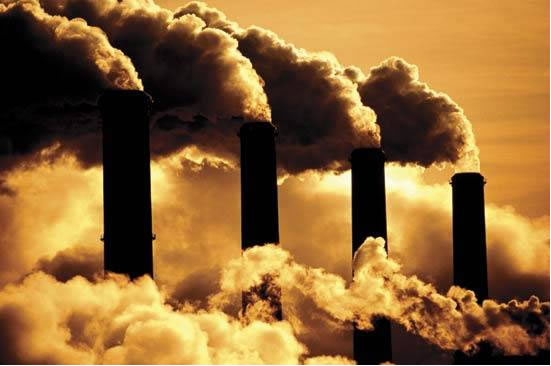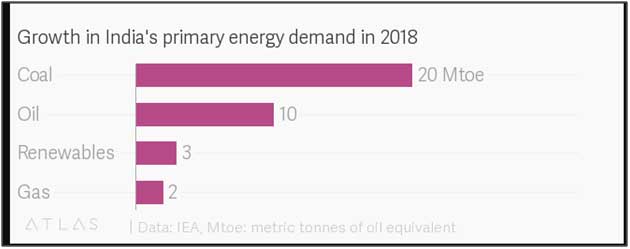
Reports cite that India’s carbon emissions are growing at a faster rate than the United States of America or China.
The World Air Quality Report 2018 prepared by Greenpeace revealed that of the 20 most polluted cities in the world, 18 are in India, Pakistan and Bangladesh.
In January 2019, the Government of India launched National Clean Air Programme (NCAP), a time-bound national level tactic to tackle worsening air quality. NCAP is supposed to be a mid-term, five-year action plan with 2019 as the first year.
The primary objective of NCAP is to reduce PM2.5 and PM10 concentration by 20% to 30% by 2024. The programmetakes 2017 as the base year for the comparison of concentration.
Then Environment Minister Dr Harsh Vardhan while launching NCAP said, “The overall objective of the NCAP includes comprehensive mitigation actions for prevention, control and abatement of air pollution besides augmenting the air quality monitoring network across the country and strengthening the awareness and capacity building activities.”
Green bodies and experts welcomed the NCAP to tackle pollution, albeit somewhat warily, particularly on the subjects of compliance and targets.
Need for a stronger mandate
NCAP mentions that the Central Pollution Control Board (CPCB) will execute this nation-wide programme in consonance with the section 162 (b) of the Air (Prevention and Control of Pollution) Act, 1986. But NCAP seems to be only “co-operative and participatory” initiative.
If NCAP remains merely an advisory, will it change anything at all? The past experiences show that MoEF&CC and the CPCB have regularly asked non-compliant cities to come up with a plan to reduce emissions from time to time. It could be intermittently followed only after the Supreme Court, in 2004, had then asked ten polluted cities to prepare roadmap to reduce emissions.
Perhaps, the MOEF&CC is hoping that the proposed institutional arrangement would include an apex committee under the MoEF&CC at different levels – be it a committee at the state level or a committee at the city level. It must also be noted that the National Green Tribunal (NGT) earlier this year asked chief secretaries of all the states to take the responsibility of preparation of action plan and implementation of non-compliant cities.
Environmentalists also point out one important aspect of NCAP. They say, “It [NCAP] fails to establish state and city level emission targets. It must include a new thrust on compliance with the national as well as state and city level regulations on emissions supported by necessary enforcement actions.”
A pressing demand has been to frame a policy in a way that provides sector-wise targets. Every city must have its roadmap to reduce emissions in line with the National Clean Air Programme. Apart from this, strong legal backing to take action against non-implementation of the plan is also required.
NCAP also includes an increasing number of monitoring stations in the country. It includes rural monitoring stations, technology support, emphasis on awareness and capacity building initiatives, setting up of certification agencies for monitoring equipment, source apportionment studies, emphasis on enforcement, specific sectoral interventions etc.
The most perplexing aspect of NCAP is the absence of a robust fiscal and funding strategy. “Clearly, NCAP cannot be sustainable nor can it gain strength or make a difference on a longer-term basis if it lacks fiscal strategy,” said Abhishek Saha, a member of Mumbai Air Collective.
Increasing carbon emissions
On one hand government is proposing Clean Air Programme, while on the other, reports cite that India’s carbon emissions are growing at a faster rate than the United States of America or China. According to a new report by the Paris based International Energy Agency, Carbon-di-oxide emissions in the country rose 4.8% from the previous year. The report states that emissions from India accounted for 7% of the global CO2 burden in 2018 in comparison to the USA’s 14%. And, the major reason for increase in carbon emissions is due to increase in fossil fuels.
India has set renewable targets for 2022 but it’s hard to achieve if the trends continue in the similar fashion. Till date, the vast population of the country is highly dependent on fossil fuels.

Under the Paris agreement, India set a target to reduce emissions intensity of its economy around 30% by 2030. But at the same time, new coal fired power plants have been installed citing demands pressed by growing population.
Health and NCAP
Although the policy document continues to express skepticism about the existing health impact studies and evidence related to air quality, it is encouraging to see that it has finally proposed support for health impact studies. NCAP has now taken on board the National Health Environmental Profile of 20 cities that the MoEF&CC initiated along with the Indian Council of Medical Research with special focus on air pollution and health. It has asked the Ministry of Health and Family Welfare to maintain health database and integrate that with decision making. It has recommended support for studies on health and economic impact of air pollution.
“Health is one of the major reasons why there is a resounding chorus and deep public interest in binding air quality targets with an effective accountability framework is because there has to be zero tolerance for health emergency,” said Dipti, an Environmental activist based in Mumbai.
There is not an iota of doubt that air pollution is the top killer today. Children, the ailing, elderly and the poor are the most vulnerable. Air pollution control cannot remain only policy intent. Local and national action will have to have teeth and grit to make a difference and save lives.
Now about a year has passed since the launch of NCAP but still all the cities have not come up with proper plans to reduce emissions. Local administration are still unaware about the program, which is also a reflection of the willingness to tackle the crisis. It is high time that the policy implementation process must also be reviewed and stringent action be taken against the responsible authorities.
Rohin Kumar is an independent journalist.
SIGN UP FOR COUNTERCURRENTS DAILY NEWS LETTER









































